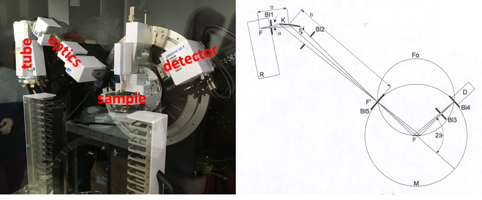ECTS
4 credits
Training structure
Faculty of Science
List of courses
Choose 2 out of 3
Supplements in solution chemistry
2 creditsCrystallography I
2 creditsAnalysis of biomolecules by mass spectrometry
2 credits
Supplements in solution chemistry
Level of education
Bachelor's degree
ECTS
2 credits
Training structure
Faculty of Science
This course on solution chemistry aims to introduce the various concepts necessary for studying complex liquid mixtures used in separation chemistry. The approach taken is mainly thermodynamic. In particular, we explain the role of concentration effects, beyond the ideal laws that apply only to dilute solutions.
CM: 12 H
Tutorial: 8 hours
Crystallography I
Level of education
Bachelor's degree
ECTS
2 credits
Training structure
Faculty of Science

This lecture, delivered entirely in English, provides a basic introduction to crystallography and electron diffraction for beginners. X-ray diffraction is an important characterization technique in modern chemistry; the majority of crystalline structures in inorganic and organic solids have been solved using this method. It is therefore important for all students to understand its basic concepts and instrumentation. The course provides explanations and principles of X-ray diffraction together with the geometry and symmetry of X-ray patterns. In addition to the interaction principles of X-rays and matter, it covers how to obtain quantitative intensities for single crystal and powder diffraction patterns. It naturally includes an understanding of lattice planes and the reciprocal lattice concept together with the Ewald sphere construction. Furthermore, it provides a basic understanding of the Fourier transform relationship between the crystalline structure and the diffracted intensities, as well as the reciprocal lattice concept.
Electron diffraction is a complementary technique to X-rays that provides information in terms of symmetry and geometry on the materials studied. In this course, we will therefore approach the description of the method for obtaining electron diffraction patterns and their interpretation. We will be able to obtain the lattice parameters, the reflection conditions, as well as the groups of possible spaces.
This lecture also serves as the introductory part to the lecture Electron Microscopy and Crystallography II.
CM: 14
TD: 6
Analysis of biomolecules by mass spectrometry
Level of education
Bachelor's degree
ECTS
2 credits
Training structure
Faculty of Science
Knowledge of the latest mass spectrometry techniques for the qualitative analysis of organic molecules and biomolecules.
1) Description of fundamental principles (Ion science and technology):
- Ionization techniques
- Analysis techniques
- Tandem mass spectrometry (MS/MS)
- LC/MS and LC/MS/MS couplings
2) Application in the context of biomolecule analysis and monitoring of organic chemistry reactions.
Hourly volumes*:
CM: 3 p.m.
Tutorial: 5 hours

